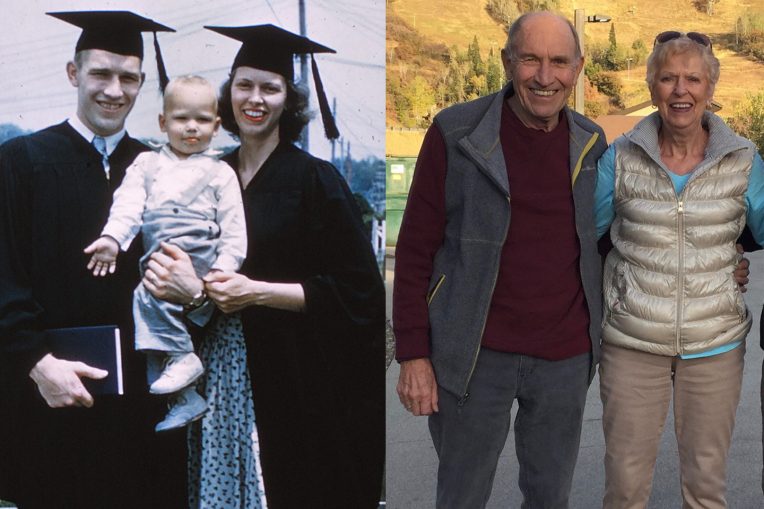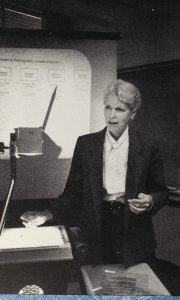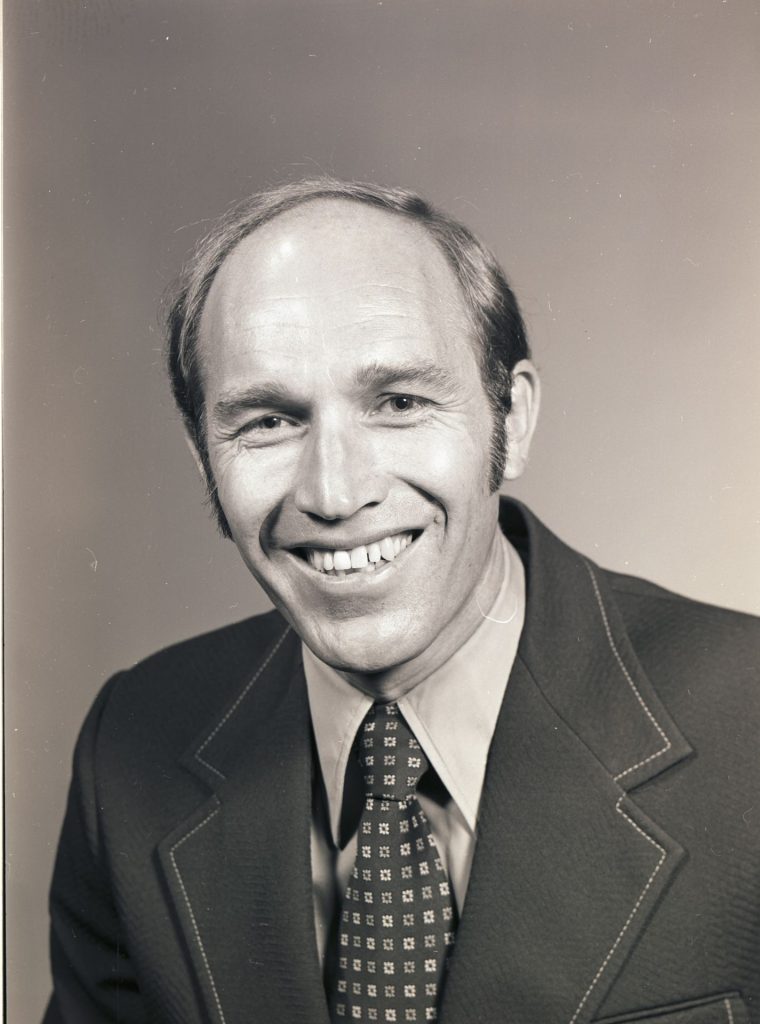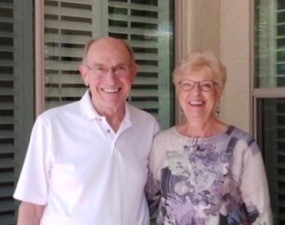While still in his 20s, Clayton Thomas was chosen by his superintendent to be the district’s next junior high school principal. The young Iowan had already excelled as a teacher, coach, assistant principal, and was already pursuing a doctorate in education.
After the district’s superintendent approved the hire, the next stop was the school board. The board proceeded to sign off on the new hires until Clayton’s name was called.

“They said I was too young and rejected the appointment.” he said.
The year of the snubbing was 1962. Had things gone differently, Illinois State’s Department of Educational Administration and Foundations (EAF) may have been denied one of its best leaders.
Thomas earned his doctorate in educational administration from the University of Iowa in 1964, and Illinois State immediately nabbed him to be the fourth faculty member of the new department, then the Department of Educational Administration (EA).
“Because the department was new and still developing, my role was part-time teaching graduate courses in administration and part-time in undergraduate secondary education,” Thomas said. “It was appealing to me to get in on the ground floor of an exciting new program.”
Dr. Donald Prince, the department’s founder, was unphased by the talented educator’s age. However, he respectfully ribbed Thomas as the “junior member” of the faculty for decades.
In total, Thomas committed 30 years to Illinois State, gradually earning a reputation as a top researcher and trainer in organization development (OD).
The OD courses he taught focused on developing interpersonal skills along with strategies for bringing about changes within an organization.
“These strategies were especially effective when applied to conflict situations where communications had broken down,” Thomas said.
As a result, many of his public service and consulting activities focused on racial and multicultural conflicts.
Dynamic duo
Thomas didn’t join Illinois State alone. He and Dr. Bonnie Thomas, M.S. ’67, Ed.D. ’72, are the epitome of high school sweethearts. The couple started dating at Cedar Falls High School in Iowa and will celebrate 66 years of marriage in 2021.
“I worked twice as hard because I wanted there to be no doubt about whether the grade I was being given was earned or a ‘gift.’”
Dr. Bonnie Thomas
“We’ve actually known each other for 75 years; we went to the same elementary school!” Bonnie said.
They both attended the University of Northern Iowa (UNI) where they received their bachelor’s degrees and Clayton his master’s.
Bonnie, who was a year ahead of Clayton in school, was able to earn her teaching certificate and begin her professional career after her sophomore year. The couple got married the same summer that she began teaching, making her the breadwinner for the family while he worked toward his bachelor’s and played football for UNI.
“This process of one supporting the family while the other went to school was a pattern in our marriage that continued for our first 17 years,” Bonnie said.
Bonnie later finished her own bachelor’s from UNI, and her master’s and doctoral degrees from Illinois State while Clayton worked at the University.
She began her doctoral studies in the curriculum and instruction program. But at the time, it was waiting approval by the Illinois Board of Higher Education (IBHE). When that process stalled, she shifted her studies to EAF, the University’s only other doctoral program in education in the early ’70s.
For several years, Bonnie endured ear-burning comments from other students about the “advantage” of taking classes in her husband’s department.
“On the contrary, I worked twice as hard because I wanted there to be no doubt about whether the grade I was being given was earned or a ‘gift,’” Bonnie said.
“We believe EAF has sustained its reputation and leadership role because of its ability to adapt to changing needs for educational leaders.”
Drs. Clayton and Bonnie Thomas
“I made sure I never took any of the courses Clayton taught … which I finally did as a postdoctoral student.”
After graduation, Bonnie became the in-service coordinator at the Regional Education Service Center and later became an assistant professor at Illinois State in the Department of Curriculum and Instruction. For the final 20 years of her career, she served as an associate professor at Illinois Wesleyan University (IWU), teaching its undergraduate elementary teacher education courses and supervising student teachers.
A new direction
During Clayton’s time with EAF, including nine years as chair, the department strengthened its standing nationally, established a new program in higher education, created international connections, and increased enrollment.

However, he points to a specific experience as the catalyst for his leadership, research, and teaching until his retirement in 1995.
In 1970 Clayton went on sabbatical to the University of Michigan. For context, that was just a few months following the Kent State shootings.
“When I got to Ann Arbor, student unrest over the Vietnam War was in full swing, and the students were occupying the administration building and had taken over the campus,” he said.
The campus climate engulfed his work. Instead of studying collective bargaining and labor relations, he ended up participating in Dr. Ron Lippitt’s Planned Change Lab. Lippitt, a renowned social psychologist in group dynamics, had become dissatisfied with ivory tower research that couldn’t improve the actual problems of everyday life. His lab became a training and consultation program, drawing clients from the surrounding area.
Clayton and the other participants applied Lippitt’s teachings to assist strategic planning and conflict management for organizations around Ann Arbor.
“We were essentially activists for positive change, equipped with new interpersonal skills and change strategies,” he said.
When Clayton returned to Normal, his work moved away from the areas of school finance and business management.
He redirected his focus on developing and teaching an organization development course. He then began applying those same strategies to assist organizations with internal conflict, often centered on deep seated racial or social issues. The course also involved Lippitt’s “reality practice” consisting of role playing to learn interpersonal skills and strategies.
To increase his knowledge base, Clayton engaged in every relevant seminar, workshop, and community event. He was also invited to participate in a national training effort called Respecting Ethnic and Cultural Heritage (REACH). REACH confronted issues surrounding race, ethnicity, social class, sexual orientation, and age. Within the 10-person group, he was the only educator, one of two white males, and the oldest participant. The group’s first task was to develop training materials.
“That was an interesting and new experience for me, and was invaluable when it came to serving future leaders in education,” he said.
Clayton said the training materials went through months of extensive evaluation by the group at weekend retreats before they were used publicly.
“By then, each team member was highly sensitized to most diversity issues,” he said. “The ultimate objective was for us to serve as the trainers of diversity trainers.”
When REACH was over, Clayton collaborated with EAF faculty to develop similar programming at Illinois State, including workplace diversity and organization development in multicultural settings
Diversifying the enrollment, faculty, and curricula within EAF was a top priority for Clayton, as well. Though improvements were made during his nine years as chair, he is envious of the variety of thought and experience found within EAF today.
“The diversity of the faculty is impressive and unquestionably contributes to EAF’s success,” he said.
The Thomas’ got a chance to see the department in-person a few months before the start of the Pandemic. Though they are based in Tucson, they lived in Central Illinois and visited family for several years after retiring,
“It is hard to describe the emotion when walking into an environment where you invested the preponderance of your professional life and only recognize the physical walls, and some of them had been removed!” he said.
Accomplishments
Clayton was the chair of the department when it went from “EA” to EAF. However, the integration of foundations and research courses was part of a larger reorganization taking place within the college.
“Ironically, I was now challenged to do for the department that which I had spent years doing for other organizations,” he said.
“This was an especially exciting time. I instigated off-campus retreats as one strategy and employed other techniques that I taught in my organization development class.”
Since then, foundations courses have become integral to the department’s graduate and undergraduate programming.
EAF Chair Dr. Lenford Sutton said, “These courses lay the metaphorical groundwork for educators to reflect upon their own biases, and the systemic racial, social, and economic injustices and inequities present in P-20 education across the U.S.”
Clayton also was instrumental in the establishment of the University’s partnership with Thailand’s Srinakharinwirot University (SWU) in 1983.
That connection was instigated by EAF alum and SWU administrator, Dr. Sermsak Wisalaporn, who sought to introduce Thai government officials to an alternative to the country’s authoritarian leadership style. Clayton’s OD course was the inspiration, and the final product was a three-day seminar created by Clayton, Bonnie, Wisalaporn, and Thailand’s own prime minister, Prem Tinnasulanon. SWU soon sent 12 students to Illinois State to earn their Ph.D.s in various disciplines across the University.
EAF subsequently created a path for 36 Thai administrators to complete their doctoral degrees through the department. After EAF faculty traveled to Thailand to teach some basic courses, the international students finished their course work and dissertations in Normal.
“This was one of my top moments as an administrator, and I take great pride in the fact that the relationship between ISU and SWU remains strong today,” Clayton said.
When Clayton transitioned to an administrative position within the Graduate School in 1986, he secured over $55,000 in funding for a campuswide faculty exchange program for the two universities’ faculty. He also obtained over $50,000 in grant funding for a minority research fellowship program.


Retirement?
Clayton finished his Illinois State career with a nine-year stint in the Graduate School, including a two-year stint as acting associate vice president for research and serving as the dean of graduate studies. Bonnie moved on from Wesleyan at the same time.
Though they left higher education in the mid-1990s, the Thomas’ never truly retired. Clayton consulted with organizations on their strategic planning goals for several years, and they both remain active in leadership roles within their community.
Academic work turned into a hobby for Clayton. He writes history features for an Iowa newspaper called the Greene Recorder. Over the last three years, his extensive research pieces have earned two first-place (and a second-place) awards from the Iowa Newspaper Association in its statewide contests. He also published two books on similar topics related to Northeast Iowa history.
EAF pride
The Thomas’ helped to build EAF’s tremendous legacy in education, but they notice an important parallel between the community between now and then.
“We believe EAF has sustained its reputation and leadership role because of its ability to adapt to changing needs for educational leaders,” they said.
“The department is much different that it was 61 years ago. If it were not, it would not have achieved the reputation that it has.”




